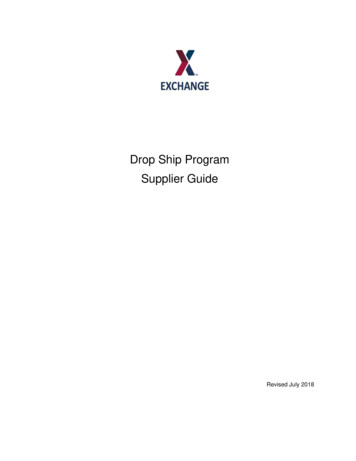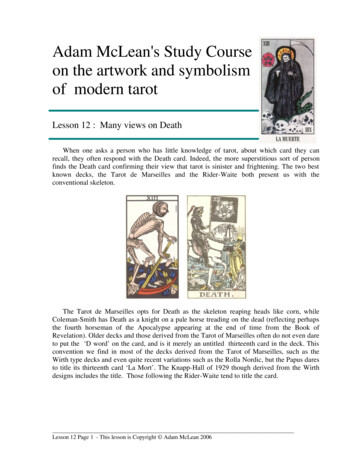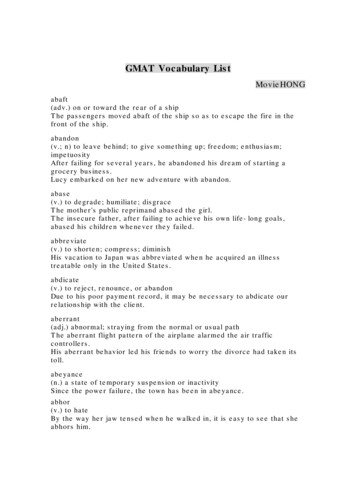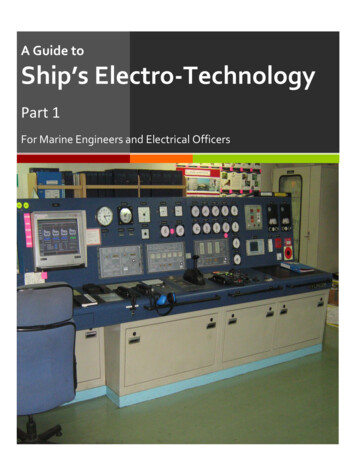
Transcription
The Death Shipby B. Traven(Originally written in English in 1923 or 1924, translated into German by B. Traven himself andfirst published as Das Totenschiff.Die Geschichte eines amerikanischen Seemanns in Berlin, 1926.The first edition in English appeared in 1934)
Song of an American SailorNow stop that crying, honey dear,The Jackson Square remains still hereIn sunny New OrleansIn lovely Louisiana.She thinks me buried in the sea,No longer does she wait for meIn sunny New OrleansIn lovely Louisiana.The death ship is it I am in,All I have lost, nothing to winSo far off sunny New OrleansSo far off lovely Louisiana.2
THE FIRST BOOK3
1We had brought, in the holds of the S.S. Tuscaloosa, a full cargo of cotton from New Orleans toAntwerp.The Tuscaloosa was a fine ship, an excellent ship, true and honest down to the bilge. First-ratefreighter. Not a tramp. Made in the United States of America. Home port New Orleans. Oh, goodold New Orleans, with your golden sun above you and your merry laughter within you! So unlikethe frosty towns of the Puritans with their sour faces of string-savers.What a ship the Tuscaloosa was! The swellest quarters for the crew you could think of. There was agreat shipbuilder indeed. A man, an engineer, an architect who for the first time in the history ofshipbuilding had the communistic idea that the crew of a freighter might consist of human beings,not merely of hands. The company who had ordered the ship to be built had, somehow, made thegreat discovery that a well-treated, well-fed, well-housed crew is worth more to the welfare of aship and its ability to pay high dividends than a crew treated like bums. Everything was as clean asa Dutch girl.Showers whenever you wanted them. Clean bed-sheets and clean pillow-covers twice a week. Yes,sir. Everything was solid like rock. The food was good, rich, and you could have as much as youcould pack. The mess-gear always polished like in a swell hotel dining-room. There were twocolored boys to attend to our quarters and mess to keep them spick and span like a peasant home inSweden at Whitsunday. All for no other reason than to keep the crew in fine health and in highspirits. Yes, sir.I second mate? No, sir. I was not mate on this can, not even bos’n. I was just a plain sailor. Deckhand you may say. You see, sir, to tell you the truth, full-fledged sailors aren’t needed now. Theyhave gone for ever, I think, with the last horse-drawn cab in New York. A freighter of today isn’t aship at all. A modern freighter meant to make money for the company is only a floating machine.You may not know very much about ships, sir, but, believe me, real sailors wouldn’t know what todo with a modern ship. What such a ship needs is not sailors who know all about rigging; what shereally cries for is men who are good engineers, mechanics, and working-men who know machinerywhen they see it. Even the skipper has to be more of an engineer than a sailor. Take the A.B., theable-bodied sailor, who used to be more than anybody else a real sailor; today he is just a plainworker tending a certain machine. He is not supposed to know anything about sails. Nobody wouldask him to make a proper splice. He couldn’t do it for a hundred dollars. Nevertheless he is as gooda sailor on a modern freighter as his grandfather was on a three-mast schooner. Yes, sir.All the romance of the sea that you still find in magazine stories died long, long ago. You wouldlook in vain for it even in the China Sea and south of it. I don’t believe it ever existed save in seastories — never on the high seas or in seagoing ships. There are many fine youngsters who fell forthose stories and believed them true, and off they went to a life that destroyed their bodies and theirsouls. Because everything was so very different from what they had read in those alluring stories.Life on the sea is not like they make it out to be and it never was. There is a chance, one in ahundred, maybe, that at some time romance and adventure did exist for skippers, for mates, forengineers. You still may see them singing in operas and making beebaboo in the movies. You mayfind them also in best-sellers and in old ballads. Anyway, the fact is that the song of the real andgenuine hero of the sea has never yet been sung. Why? Because the true song would be too crueland too strange for the people who like ballads. Opera-audiences, movie-goers, and magazinereaders are like that. They want to have everything pleasant, with a happy ending. The true story of4
the sea is anything but pleasant or romantic in the accepted sense. The life of the real heroes hasalways been cruel, made up of hard work, of treatment worse than the animals of the cargo get, andoften of the most noble sacrifices, but without medals and plaques, and without mention in stories,operas, and movies. Even the hairy apes are opera-singers looking for a piece of lingerie.I was just a plain deck-hand. What you might call a handy man aboard. I had to do every kind ofwork that came my way or that was pushed my way. In short, I was just a painter and brasspolisher. The deck-hands have to be kept busy all day long. Otherwise they might fall for somedangerous ideas about Russia. On a modern ship, once under weigh, there is little to do outside ofthe engine-holds. Sometimes repairs have to be made on deck or in the holds. Holds have to becleaned or aired. The cargo has shifted, perhaps, and has to be put back into place to keep the shipfrom hanging down a fin. Lamps have to be cleaned. Signal flags set in order. The life-boatswatered and inspected. And when nothing else can be done on deck, the hands paint. Always thereis something to be painted. From morning to night.There comes a day in the deck-hand’s life when he feels convinced that there are only two kinds ofpeople on earth, those who sail the high seas and those who make paint. You feel a sort of gratitudetowards those good people who make all that paint, because should they ever stop, the second matewould surely go mad wondering what to do with the deck-hands. The deck-hands can’t get paid forjust looking around the horizon or watching the smoke of another ship coming up. No, sir.The pay was not high. I have to admit that. The company could not have competed with the Germanand the Italian freight rates had they paid us the wages of the vice-president of a railroad. They saythe whole trouble is that sailors don’t know what to do with their pay; otherwise they might easilyown, after a couple of years, five or six seagoing freighters.For my part, not being under the influence of the success stories of the builders of our nation, Ireckoned like this: if I would not spend a cent of my pay for twenty-five years and I would tuck itaway in a trust or bank and if I would never have, during these twenty-five years, one week withoutpay, but work hard all the time, even then I could not retire and live on my dividends. Still, afteranother twenty-five years of equal pay and of equal good luck in always having a ship, I might bythen call myself a useful and honest citizen and a member of the lower middle-class, ready to buy agas-station somewhere on a highway. A fine and noble prospect it convinced me to stay a plainsailor for a good long while and so prepare myself for the bread in heaven and leave for others thecake here on earth.The other guys had gone ashore. I didn’t care to see the city. I don’t like Antwerp. There are toomany beachcombers, bums, worthless sailors, and drunken ships’-carpenters around anyway. Oneshould not mix with such people, being a sailor on a smart American freighter, and a freighter fromNew Orleans at that. Besides, I told Honey I wouldn’t play around with any dames. At least not onthis trip. No, sir. I mean, yes, sir.I have learned that it is not the mountains that makes destiny, but the grains of sand and the littlepebbles. Sounds philosophic, but it is the truth.I was alone in the foc’sle. Everybody else had gone ashore to get a bellyful of port life before goinghome to be dry again. I was sick of reading true confession stories and ranch romances. I couldn’teven sleep any more, which was strange, because I can sleep anywhere and any time. I didn’t knowwhat to do with myself. We had laid off work at noon, when the watches were assigned for the triphome.I wandered from the quarters to midship and back again. Five hundred times or more. I spit into the5
water and speculated on how far the rings might go before they died. I threw crumbs of bread intothe water to feed the fishes.It made me so very miserable to look at the offices and buildings along the docks, by now all emptyand closed. Office windows after closing hours make the same impression upon me as bleachedhuman bones found in a desolate place in the open sun. From the height of the ship I could see rightinto the offices, where on dull desks were piled up all kinds of papers, blanks, bills. Blanks too canmake me sick; they remind me of questions I have to answer to some official to whom I would liketo say whose son I think he is.All and everything about the docks and the buildings and the offices looked so utterly hopeless, likea world going to pieces without knowing it.In the end I got a craving to feel a solid street under my feet. I wanted to see people hustling about. Iwanted to make sure that the world was still going on in the usual way, doing business, makingmoney, getting drunk, laughing, cursing, stealing, killing, dancing, falling in love, and falling outagain. I really got frightened being alone there.“Why didn’t you come earlier in the afternoon like the other guys did?” the mate said. “I won’t giveyou any money now.”“Sorry, sir, to bother you, but I sure must have twenty bucks advance. I have to send it home to mymother.”“Five and not a cent more.”“I can do nothing with a five, sir. Prices are high here in Belgium since the war. I need twenty, not acent less. Maybe, sir, I mean I .might be very sick tomorrow. Who do you expect would paint thegalley then? Tell me that, sir. The galley has to be ready when we reach home.”“All right. Ten. My last word. Ten or nothing. I’m not obliged to give you even a nickel.”“Well then, sir, I’ll take the ten. But I think it’s lousy the way they treat us here in a foreigncountry.”“Shut up. Sign here for the ten. We’ll write it in the book tomorrow.”The truth is I didn’t want more than ten in the first place. But if I had asked for ten I wouldn’t havegot more than five. The fact is I couldn’t even use more than ten. Once in your pocket and out intown, the money is gone, whether you have ten bucks or two hundred.“Now, don’t get drunk. Understand. There’ll be plenty of work tomorrow and you’ve got to beready to go on hand when we’re putting out,” the mate said.Get drunk? Me get drunk? An insult. The skipper, the other mates, the engineers, the bos’n, thecarpenter haven’t been sober for six consecutive hours since we made this port. And I am told not toget drunk. I didn’t even think of Scotch at all. Not for a minute.“Me get drunk, sir? Never. I don’t even touch the cork of a whisky bottle, I hate that stuff so much.I know what I owe my country in a foreign port. I am dry, sir. I may be a Democrat, but I am dry.Ever seen me drunk, sir?”6
“All right, all right, I haven’t said a word. Forget it.”“Thank you, sir.”Ashore.7
2It was a summer twilight, beautiful and dreamlike. I was in full harmony with the world as it was. Icould not under stand how anybody on earth could be displeased with life. Communists, reformers,and hell-drummers ought to be kicked out of this beautiful world of ours. I strolled along the streets,looking at the windows where the riches of the world were on display, calling to be bought andcarried away. All the people I met seemed so satisfied with themselves and with everyone else. Thegirls smiled at me, and the prettiest were the ones who greeted me best.I came to a house that had a fine gilded front. It looked friendly, inviting, and very gay. The doorswere wide open, and they said: “Come in, good friend. Come in and be happy with the happy. Justdrop in here, and forget all your worries!”I had no worries. Yet I felt fine that somebody should call me and remind me that I might haveworries. In I went. There was a jolly crowd there. Singing. Music. Laughter. Gay talk. Everythingfriendly.I sat down on a chair, at a table. Immediately a young man came, looked me over, and said inEnglish: “How do you do, mister?” He put down a bottle and a glass. He filled the glass and said:“Drink to the greatness of your country!” So I did.For weeks I had seen only the guys of the bucket, and water and more water, and stinking paint. SoI thought again of the greatness of my country. And again. There is really too much water on earth.And most of it is salty, at that. And paint is no perfume. Well, to the greatness of my country!There was foggy weather around me. The longer I sat at the table, and the more I thought of mycountry, the thicker became the fog. I forgot all the worries I could remember ever having hadduring my life.Late at night I found myself in the room of a pretty girl. She was laughing and friendly. She wassweet.Finally I said to her: “Now look here, Mademoiselle whatever your name may be, you’re a piece ofsugar. That’s what you are. Tell me, what time is it now?”With her sweet laughing mouth she said: “Oh, you handsome boy —” Yes, sir, that’s exactly whatshe said to me. “Oh, you handsome sailor boy from the great and beautiful Amerique land, youwant to be a cavalier, don’t you? A real cavalier. You wouldn’t leave a little defenseless lady alonein her room at midnight, would you? Burglars might come and rob me or take me away to darkAfrica. They might even murder me or sell me as a slave to the wild Arabians. And I am afraid ofmice, I am.”“I am not afraid of a mouse,” I said.“Oh, you bad sailor man! That’s what you are,” the pretty lady said. “Please don’t leave me alonehere at midnight. I am so afraid of terrible burglars.”I know what a real red-blooded American must do when he’s called to rescue a defenseless lady. Itwas almost a daily sermon from the time I was a kid: “When a lady asks you to do something, youjump up and do what she says, even if it should cost you your life. Just remember that every womanis a mother or may be a mother some day. That’s a good boy.”8
What else could I do? It’s in the blood. You have to do what a lady asks you to do. Even if it shouldcost you your life.Early in the morning, before the sun came up, I hurried to the docks. There was no Tuscaloosa to beseen. Her berth at the pier was abandoned. She had gone back home to sunny New Orleans. She hadgone back home without me.I have seen children who, at a fair or in a crowd, had lost their mothers. I have seen people whosehomes had burned down, others whose whole property had been carried away by floods. I have seendeer whose companions had been shot or captured. All this is so painful to see and so verysorrowful to think of. Yet of all the woeful things there is nothing so sad as a sailor in a foreign landwhose ship has just sailed off leaving him behind.It is not the foreign country that makes him so sick at heart, that makes him feel inside like a childcrying for its mother. He is used to foreign countries. Often he has stayed behind of his own freewill, looking for adventure, or for something better to turn up, or out of dislike for the skipper or themates or some fellow-sailors. In all such cases he does not feel depressed at all. He knows what heis doing and why he did it, even when it turns out different from what he expected.But when the ship of which he considers himself still a useful part sails off without taking him withher, without waiting for him, then he feels as though he had been torn asunder. He feels like a littlebird may feel when it has fallen out of its nest. He is homeless. He has lost all connection with therest of the world, he thinks; he has lost his right to be of any use to mankind. His ship did not botherto wait for him. The ship could afford to sail without him and still be a good and seaworthy ship. Acopper nail that gets loose, or a rivet that breaks off, might cause the ship to sink and never reachhome again. The sailor left behind, forgotten by his ship, is of less importance to the life and thesafety of the ship than a rusty nail or a steam-pipe with a weak spot. The ship gets along wellwithout him. He might as well jump right from the pier into the water. It wouldn’t do any harm tothe ship that was his home, his very existence, his evidence that he had a place in this world to fill.If he should now jump into the sea and be found, nobody would care. All that would be said wouldbe: “A stranger, by appearance a sailor.” Worth less to a ship than a nail.Pretty, isn’t it? So I thought. But the depressed feeling that was looming up within me didn’t gripme in full. Before it could get hold of me I knocked it cold.Shit the bucket. There are lots of other ships in the world. The oceans are so very big and so full ofships. They have hardly room enough to sail without choking each other. How many ships arethere? Surely no less than half a million. One of those half a million seagoing ships, one at least,will need, some time sooner or later, a plain sailor. My turn will come again.As for Antwerp, well, it’s a great port. All ships make this port some day or other. What I need isjust patience. That’s all. Who would expect that somebody, maybe the skipper himself, would turnup immediately and yell out: “Hey, sailor, what about signing on? Union pay!” I can’t expectanything like that to happen.Thinking it all over, well, what’s there to worry about a faithless bucket leaving me flat in Belgium.Like all women do leave you the first time you try it out with another dame. Anyway, I have tohand it to her, she sure had clean quarters and showers and swell grub. No complaints about that.Right now they’re having breakfast. Those guys will eat up all of my bacon, and the eggs too. Thecoffee will be cold again when I come into the mess. If they leave any coffee at all. Sure the cookhas burned the bacon again. He’ll never learn. I wonder who made him a ship’s cook. Perhaps a9
Chinese laundry man. As for Slim, I see him already going through all my things, picking outeverything he likes, before he hands the bag over to the mate. Maybe they won’t even turn in mythings to the mate. Those bums. Not a decent sailor among them. Just running around with dames.Using perfume and facial soap. How I hate them! Sailors? Don’t make me laugh. But I’d never haveexpected this from Slim. Seemed to be a regular guy. You would not have believed Slim’d be thatbad; no, sir. You can’t trust anybody any longer. But then he always used to steal my good toiletsoap whenever he could lay his hands on it. What can you expect from a fellow who steals yoursoap when you’re out on deck?What’s the use worrying about that bucket? Gone. It’s all right with me. Go to the devil. The shipdoesn’t worry me at all. What worries me is something different. I haven’t got a red cent in mypocket. She told me, I mean that pretty girl I was with during the night, protecting her againstburglars and kidnappers, well, she told me that her dear mother was sick in the hospital, and that shehad no money to buy medicine and the right food for her, and that she might die any minute if shedidn’t get the medicine and the food. I didn’t want to be responsible for the death of her mother. Sowhat could I do as a regular red-blooded American except give her all the money I had left overfrom the gilded house? I have to say this much, though, about that pretty dame: she was grateful tome for having saved her mother from an early death. There is nothing in the whole wide world moresatisfying to your heart than making other people happy and always still happier. And to receive thethousand thanks of a pretty girl whose mother you have just saved, that is the very peak of life. Yes,sir.10
3I sat down on a box and followed in my mind the Tuscaloosa steaming her way home. I wishedearnestly that she would spring a leak, or something, soon, and be forced to return and give me achance to hop on again. I should have known better; she was too good a bucket to run foolishly onthe rocks.Another hope of mine went bluey. I had hoped that the crew might object to leaving me behind andmake it tough for the skipper, or even engage in a mild form of mutiny. Apparently they didn’t care.Anyhow, I wished that damned canoe all the shipwrecks and all the typhoons any sailor ever heardof from old salts spinning yarns that made even drunken quartermasters get the shivers.I was just about to doze off and dream of that little peach of a girl when somebody tapped me on theshoulder.Right away, without giving me a chance to see what was going on, he talked to me so rapidly thatmy head began to buzz.I got mad and I said: “Rats, be damned, beat it, leave me alone. I don’t like your damn jibbering.And besides I don’t know what you want. I don’t understand a single word of your blabbering. Goto the devil.”“You are an Englishman, are you not?” he asked, speaking in English.“Nope; Yank.”“Then you are American.”“Looks like it. And now that you know all about me, leave me in peace and go to your wifie. I’venothing to do with you, no business.”“But I have some with you. I am from the police.”“Your luck, old man. Fine job. How much do they pay the flats here? What’s troubling you with aswell job like that?Something wrong?”“Seaman, hey?” he asked.“Aha. Any chance for me?”“What ship?”“Tuscaloosa, from New Orleans.”“Sailed at three in the morning. A long way off, I dare say.”That made me mad again. “I don’t need you to tell me any stale jokes.”“Your papers?” he asked.11
“What papers do you mean?”“Your passport.”“What?”“That’s what I said; let me have your passport.”“Haven’t any.”“Then your sailor’s identification card or whatever you call it in your home country.” He sort ofpushed me.“My sailor’s card? Yes, yes.” Hell. My seaman’s card. Where have I got it? I remember now, it’s ina pocket of my jacket; and my jacket is in my sailor’s bag; and the bag is stowed nicely away undermy bunk in the foc’sle in the Tuscaloosa; and the Tuscaloosa is now gee, where can she be rightnow? I wonder what they’ve got for breakfast today. Sure, that damned cook has burned the baconagain. I’ll get him some day and tell him what I really think of him. Just let me be around, paintingthe galley. Guess I’m getting hungry.“Well, well,” said the flat, shaking me, “your sailor’s card. You know what I mean.”“My sailor’s card? If you mean mine, what I want to say, my sailor’s card I’ll have to come cleanabout that card. The truth is, I haven’t got any.”“No sailor’s card?” He opened his eyes wide in sheer astonishment, as if he had seen a ghost. Thetone of his voice carried the same strange amazement, as if he had said: “What is that, you don’tbelieve there is such a thing as sea-water?”It seems that it was incomprehensible to him that there could be a human being with neither apassport nor a sailor’s card. He asked for the card for the third time, almost automatically. Then, asthough receiving a shock, he recovered from his astonishment and sputtered: “No other paperseither? No identification certificate? No letter from your consul? No bankbook? Or anything likethat?”“No, no, nothing.” Feverishly I searched my pockets, so as to make a good impression upon him. Iknew quite well I had not even an empty envelope with my name on it.Said he: “Come with me.”“Where to?” I wanted to know. Perhaps he was sent to fish up some derelict sailors for a rum-boat. Icould tell him right then that not even wild horses could drag me aboard one.“Where? You will find out pretty soon. Just keep going.” He wasn’t so friendly any more.After some hopping we landed. Where? Yes, sir, you guessed right. In a police-station. Here I wassearched, and how! When they had searched all over, and had left unsearched not even the seams ofmy clothes, one of the searchers asked, absolutely seriously: “No arms? No weapons of any kind?” Icould have socked him one right then, I was so mad. As if I could hide a machine-gun in mynostrils, and a couple of automatics under my eyelids. That’s the way people are and you can’t doanything about it.The examination over, I had to stand up before a high desk, behind which sat a roan who looked at12
me as if I had stolen his overcoat. He opened a thick book filled with photographs. The guy that hadpinched me acted as the interpreter. Without him I would never have known, until the end of mydays, what the man behind the desk wanted. Funny that these people understood our language prettywell when they needed our boys to fight for them, and when they wanted our money.The high priest at the desk looked at all the photographs, and after each photograph he looked atme. He did this a hundred times. He had that way of looking upwards with his nose kept close to thethick book that people have when they look over the rims of their eye-glasses.At last he got tired of moving his neck up and down. He shook his head and disgustedly closed thebook with a bang. It seems he hadn’t found my photograph. I could have told him before that hewouldn’t, if he only had asked me, because I knew damn well that I had never been photographed inAntwerp. I too got tired of this lame business, and I said: “Now I am hungry. I want to eat. I haven’thad any breakfast this morning.”“Right,” the interpreter said. I was taken into a small room, with nothing in it that I would callfurniture.I wonder if all the Belgians call what I got a breakfast coffee, bread, and margarine. It was theminimum in quantity and quality.Then I was left alone to occupy myself with counting the bars at the window, a job I did rather well.About noon I was again brought before the high priest. “There are nine,” I said right away, “exactlynine.”“What nine?” the high priest asked with the help of the interpreter.“Nine bars at the window,” I answered.The high priest looked at the interpreter, and the interpreter looked at him, and then both of themlooked at me, finally shaking their heads; and the interpreter said: “Well, they are this way, sir. Youknow it from the war. There is something loose in their upper stories. One cannot take themseriously.”“Do you wish to go to France?” the high priest asked me.“No, y’honor, I don’t like France. Under no circumstances do I wish to go to France. I don’t likewar-mothers running wild about the battlefields. No, France is no place for me.”“What do you think of Germany?” He asked.“I don’t care to go to Germany either, if you please, sir.”“Why, Germany is quite a fine country. Take Hamburg for instance. You could easily find there agood ship to take you home.”“No, I do not like the Germans. They often go out of their minds without any warning.”The high priest assumed a dictatorial attitude: “Well, then, it is all settled now, once and for all. Nomore objections on your side, sailor. You are going to Holland. And understand, this is final.”13
“But I do not like the Dutch,” I said, and I was just about to tell him why, when he cut me short:“We do not care a rag if you like the Dutch or if you don’t. You may fix this with the Dutchyourself, when you meet them in person. In France you would be best off. However, for a richgentleman like you, France is not good enough. Too bad we have nothing better to offer you. Youdon’t want to go to Germany either. The Germans also are not good enough for you. Hell, just tellme what people other than your own do you like? None apparently. So you are going to Holland,and that is that. We have no other border. We cannot, just to please you, acquire another neighborwho might find favor with you. And, just to make clear to you what we think of you, we don’t evencare to throw you into the water. That is the only border we have besides the others alreadymentioned. It’s all right with me if you choose the water. We are at your service, mister. And so youare going to Holland and like it. That’s all. Be glad you’re getting off so easily. We have jails, andwe have camps for people without papers.”“But see here, gentlemen, you are all mistaken. I do not wish to go to Holland, because the Dutch—”“Quiet now. This question has been settled, for good. How much money have you got?”“Why, you searched me all over. How much money did you find on me? That’s how much moneyI’ve got.”“Which means, in other words, not a single cent. Is that what you mean?” he asked.“Exactly, y’honor. Right you are.”“Take him back to the cell,” commanded the high priest. “Let him have a bite to eat.”A bite. I would like to know when these people really eat.14
4Late the same afternoon I was taken to a railroad station. Two men, one of them the interpreter,accompanied me. No doubt they thought I had never before been on a train, for they would notleave me alone. Not for a minute. One of them bought the tickets while the other remained standingnear me. He took good care that no pickpocket should try to search again where they had searchedwithout success. I’d like to see a smart pickpocket find a red cent in pockets that have beensearched by the police.Very politely they escorted me aboard the train and offered me a seat in a compartment. I thoughtthe gentlemen would now take leave. They did not. They sat down. Apparently afraid that I mightfall out of the window when the train was moving, they seated themselves on either side of me.Belgian policemen are courteous. I could find no fault with them. They gave me cigarettes, but nomatches. They were afraid I might set the train afire.We came to a very small town and left the train. Again I was taken to a police-station. I had to sitdown on a bench. The men who had brought me told a long story to the high priest in charge.All the policemen stared at me as if they thought me a murdere
The Death Ship . by B. Traven (Originally written in English in 1923 or 1924, translated into German by B. Traven himself and first published as Das Totenschiff.Die Geschichte eines amerikanischen Seemanns in Ber










